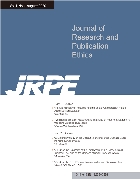 E-ISSN : 2733-7146
E-ISSN : 2733-7146
The Effect of Consciousness of Research Ethics on Job Commitment - Focusing on the Mediating Effect of Ethical Efficacy and Self-efficacy
Hee Joong HWANG
Abstract
Purpose: Since 2006, social, ethical, and institutional options have been attempted in Korea to establish research ethics; however, the effectiveness of these attempts has not been thoroughly examined. Studies have been conducted abroad to determine the timeliness of social, ethical and institutional alternatives, such as the adoption of laws governing research ethics, the improvement of research ethics education, the bolstering of systems, the introduction of incentive programs, and the creation of social environments that support research ethics. Research design, data, and methodology: Specific facets of research misconduct or research ethics must be investigated and verified. Aspects of moral growth at the person level must be investigated via research ethics and research ethics education. Results: There is an increasing need for the general public to define and uphold research ethics as the impact of research findings on society grows. Researchers can boost their confidence in their ethical judgments and actions by being aware of research ethics. This may lead to confidence in their capacity to make morally sound decisions. Conclusion: By doing this study, the researcher confirmed that ethically correct behavior can lead to and realize self-growth. Researchers may be more interested in and dedicated to their work when they feel that their research might help them mature and develop ethically.
- keywords
- Consciousness of Research Ethics, Job Commitment, Ethical Efficacy, Self-Efficacy
- Downloaded
- Viewed
- 0KCI Citations
- 0WOS Citations













